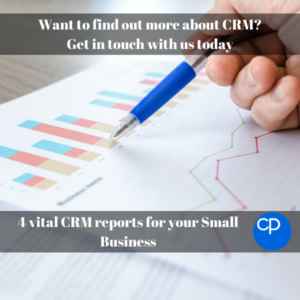Reading Time: 1min30s
 As any small business Director will know, reporting is vital in helping you manage your business and ensure that your strategic goals are on track but building those reports can be time consuming and difficult. Here’s how your CRM system can help:
As any small business Director will know, reporting is vital in helping you manage your business and ensure that your strategic goals are on track but building those reports can be time consuming and difficult. Here’s how your CRM system can help:
Forecasting CRM Reports
Good forecasting is key to ensuring that you can plan effectively and efficiently. The CRM pipeline history gives you an assessment of whether individual forecasts have, in the past, been optimistic or pessimistic, enabling relevant adjustment to the current forecast to increase its accuracy. You can then plan your resource requirements using that data.
Budgeting CRM Reports
Departmental budgeting for the new financial year is made easier when analysing reports from each department. For example, CRM marketing reports will show you which marketing activity has provided the most valuable qualified enquiries – and therefore where to focus your marketing efforts.
CRM customer service reports show you which clients make extended use of your helpdesk, which clients may need additional training, and which customer service engineers are over/under worked. This is vital in making sure enough resources are available for your customers’ needs as well as ensuring your own resources are being used optimally and fairly.
Business Alerts
A Business Alert is a report which is system-generated based on predefined conditions. For this reason, you can use CRM Business Alerts to ensure important contract renewal dates are not overlooked by alerting the relevant account manager a set amount of days before the due date. This also gives account managers enough time to contact the customer and discuss their needs and requirements before renewing and possibly updating their contracts.
Ad-hoc reporting
Finally, it’s vital to get an instant 360-degree view of all your interactions with any client by sales, opportunities, marketing, customer service, invoicing, and credit control. This flexibility in report generation is key in understanding the relationship you have with each customer, at any given time, as each customer relationship is unique.
What makes reporting work
Of course, to make all this work you will need a CRM culture within your business. Your personnel will have to understand how important it is to record every interaction that they have with your clients and how every department in the business relies of the timeliness and accuracy of this data. Without quality data, reporting does not work.
If you want to find out more about how CRM can give you a 360-view of your business and clients, feel free to get in touch.




